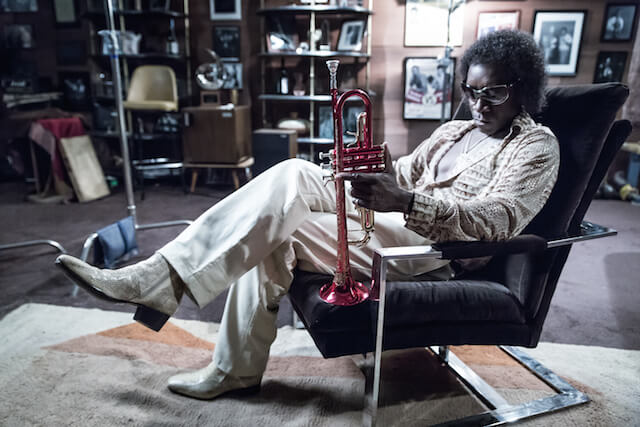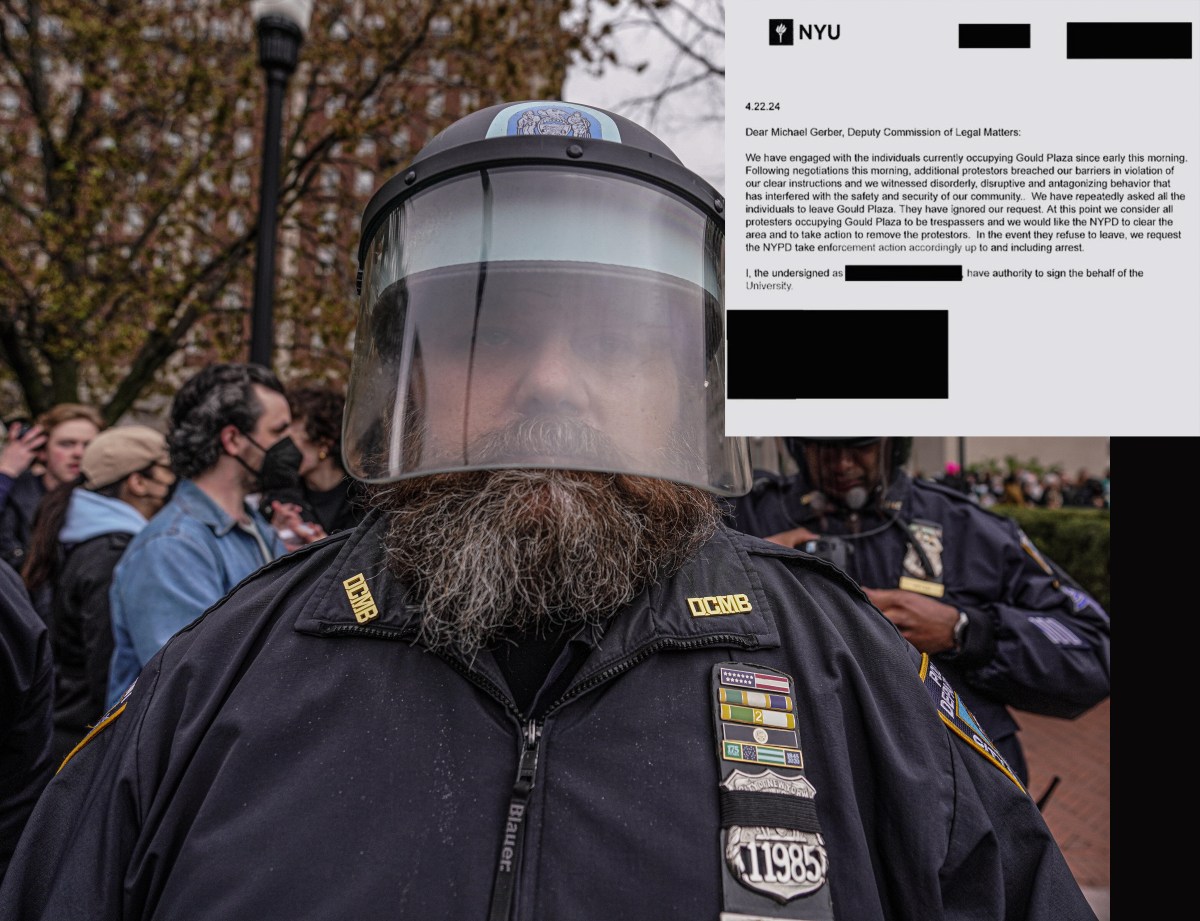‘Miles Ahead’ The bar is set so low for biopics that one can flip over Don Cheadle’s Miles Davis movie just because it’s out-there. Not only does most of it take place in 1978, deep into his hiatus/drug stretch, but there’s also a car chase, a shoot-out and a coda where Cheadle’s Davis plays on stage in 2015 with a jacket sporting a hashtag. (Samuel Fuller once wanted to make a movie about Balzac that started with a carriage chase. “Miles Ahead” is in the Fuller spirit.) It has flashbacks to the glory days, but they’re relatively sporadic and they mostly revolve around Frances (Emayatzy Corinealdi), the wife who got away. The story of how Davis discovered John Coltrane is talked about (briefly), not shown, while Davis himself, when prompted, summarizes his entire life story in one testy sentence. “If you want to tell a story, come with some attitude,” he says, twice, just to underline its m.o. “Miles Ahead” isn’t just reluctant to be a traditional Miles Davis movie; it’s ostentatious as well as confrontational about it. But there’s more to it than shtick. Yes, instead of The Miles Davis Story, we get a rollicking, comedic sorta-thriller. There are plenty of stories, most of them surely apocryphal, of Davis’ wild antics in his super-duper-wild days, but Cheadle, who also directed, and his co-writers make one up. One normal wasted day, he’s greeted by a shady journo, Dave Brill (Ewan McGregor), on his doorstep. “I’m here to write your comeback story!” he enthuses. Then Davis punches him in the face. But Dave grows on him, sort of, just in time for Davis to run afoul of a slimy A&R man (Michael Stuhlbarg), whose hired goons have absconded with a stolen tape of sessions that may or may not become his first record in five years. Hence the car chase. RELATED: What to see at the New York Film Festival during its final weekend Peppered throughout the mayhem are Davis’ wistful/harrowing memories of a beloved bad relationship. Frances Davis — an occasional star on his record covers, most iconically “Someday My Prince Will Come” — is a co-executive producer, though it’s no vanity project. Corinealdi’s Frances starts off as a gauzy dream girl then slowly grows in agency. At one point Davis, a professional dancer always on tour, demands she quit professional dancing (even though he’ll slip into a bed full of women shortly after a heartfelt phonecall). She quietly implodes before storming off, bristling at the idea that only one of them can have an artistic passion. There are screaming matches, even a beating, but “Miles Ahead” isn’t out to remind us what a sonofabitch so-and-so was backstage. That’s how it usually goes with these things; just wait for the inevitable John Lennon biopic that uses all the new intel released about what a bastard he was, stressing the drama over the art. “Miles Ahead” avoids this, even as it depicts a real low-point in its genius’ life. Cheadle’s Davis is down and out, not working, can barely toot a trumpet anymore — and that’s how he likes it. He’s happy as a pig in s—: pulling guns out on execs; snapping at beloved jazz DJ Phil Schaap on the air for playing the overrated-to-him “Kind of Blue”; deploying a potentially Guinness-level number of “motherf—ers.” But this is all played as comedy — broad comedy, even. That tone may rile some, and understandably. But it also protects it from being another roll through the dark side of someone who was brilliant but not very nice. And Cheadle makes not being nice hilarious, even endearing. His Miles Davis Gravel Voice is more like a whisper, but it’s a glorious comedic turn. How much “Miles Ahead” actually has to say about Davis himself is debatable — but it definitely has plenty to say about how artists view their past work, their careers and their alleged responsibility to keep at the job of creation. As shown in 1978, Davis is no longer so interested in the horn; when we finally hear snippets of a recently recorded session, Dave asks him when he comes in. Davis responds that he’s already there; he’s the guy playing the organ, his new toy. But his interest in recording music is now mostly about getting checks from his label, and howling like a spoiled kid when they’re late. And why should he be stoked even if he was inspired? People only talk about the “old s—,” as he puts it. But that’s “the stuff people dig,” a kid tells him when Davis and Dave crash his Columbia dorm room to score some coke. (Please say this story is on the level.) We’ve been trained to think of artists, especially geniuses, as Midas types, though we tend to only go batty over a handful of works, and from a slim period of their entire career. Untold musicians crank out gobs of work after their prime, though only a few bother to keep up. How many beyond the dedicated know much about David Bowie past “Let’s Dance,” or Bob Dylan after “Nashville Skyline,” or Jean-Luc Godard beyond “Weekend”? The throngs just wants the hits, recycled ad infinitum by their creators until they pass on. “Miles Ahead” entertains the notion that even Miles Davis — in fact, especially Miles Davis, and especially Miles Davis in 1978 — was annoyed everyone creamed over work that was long behind him, even if he hadn’t released new material in ages. Think about stuff you did even just 15 years ago. Imagine the world freaking out over things you made when you were younger and almost certainly a different person. Cheadle’s Miles Davis is a cartoon, even in the halcyon day flashbacks, but he’s more real than most artists depicted in movies. Though we barely see him play, you can sense that what ails him isn’t that he no longer likes music, or that he actually hates his old standbys. It’s that he always needs to push forward. He’s just in a creative valley. The past and his old songs are strictly for nostalgia, and maybe some self-hatred. He wants to try something new. So does “Miles Ahead,” and it get brownie points for above-and-beyond creativity. It doesn’t always work, as they say. The Frances stuff can be muddled and sometimes a mere intrusion on the main story. Sometimes it lets more traditional biopic scenes in through the gate anyway, like a scene where young Davis is accosted by a racist cop for “loitering” outside the club he’s about to play in — exactly like the scene in “Straight Outta Compton,” only dropped into a film with only transient interest in depicting Davis’ struggles against racism. But more often than not it lets its shagginess work for it, not against it. It can do what it wants. It can segue into sketches of “Sketches of Spain” being recorded. It can occasionally stop for Davis to launch into real meat-and-potatoes talk about musical composition, as though he was temporarily getting his mojo back before falling back down. And, of course, it can dream up a car chase and a fight at a boxing match. It knows it’s the first Miles Davis movie with big stars, but it feels no compunction to be the official one. It’s free to be messy, fun and vital, all without succumbing to biopic-y self-importance. Follow Matt Prigge on Twitter @mattprigge
4 Globes
NYFF review: ‘Miles Ahead’ is a crazy, goofy but vital portrait of Miles Davis

Sony Pictures Classics


















